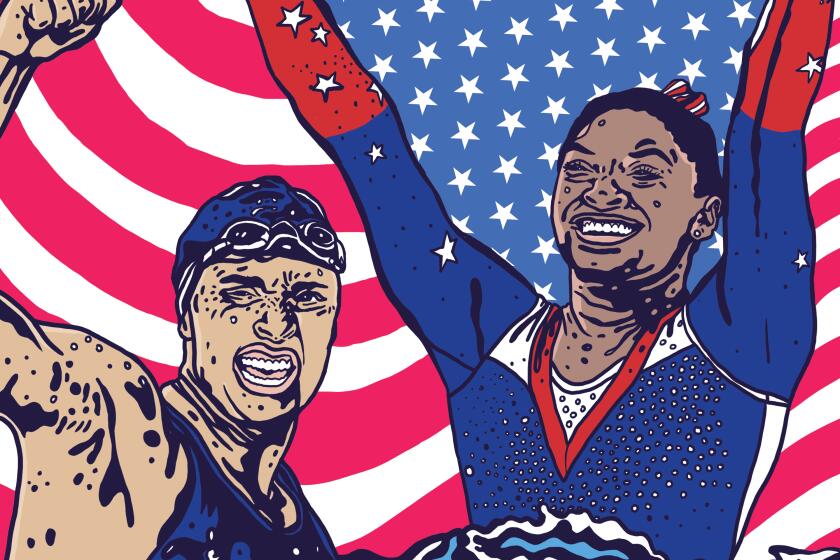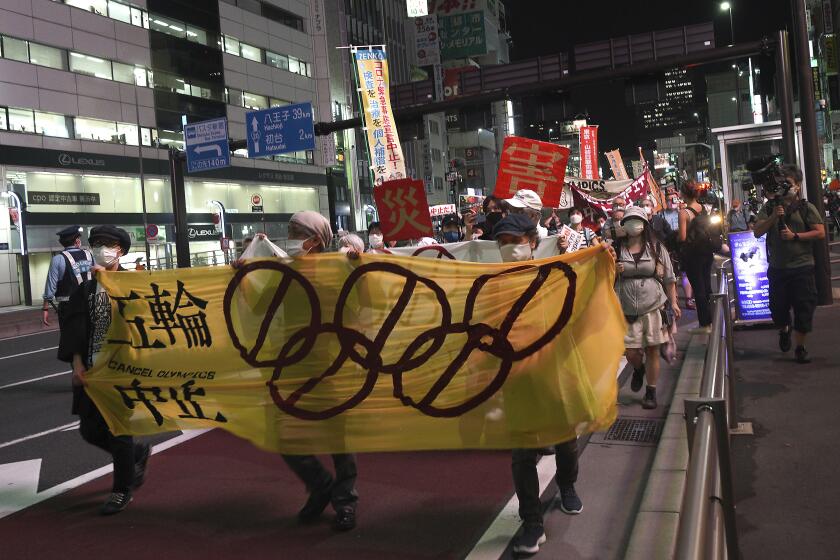“Tokyo Olympiad” (1965), the official documentary commissioned by the organizing committee and the Japanese government, opens with the words, “The Olympics are a symbol of human aspiration.” This is followed by an impossibly bright sun against a red sky and then a wrecking ball demolishing old buildings in anticipation of the Games and Japan’s future.
Directed by Kon Ichikawa, who is placed by some critics on the highest echelon of Japanese cinema, the film offers a human-scale portrait of the Games, an artist’s interpretation of the athletes and spectators. It is part of the Criterion Collection’s archival restoration project “100 Years of Olympic Films: 1912-2012,” currently streaming on the Criterion Channel and HBO Max.
Though now considered one of the great sports films of all time, Ichikawa’s original, nearly three-hours-long submission — which dispensed with many traditional tropes of the form — was not accepted by the organizing committee. Expecting an exaltation of victors and an aggrandizement of the host country’s preparations and successes, the committee requested that Ichikawa cut the film to the essential elements. That 93-minute version was released in the U.S., but Ichikawa’s vision persisted and the longer cut was critically acclaimed and won two BAFTA Awards.
Ichikawa utilized the tools of his craft — multiple cameras, slow-motion, still photography, state-of-art technology and a phalanx of editors — to view the athletic competition as an art form. An eclectic use of music, featuring Toshirô Mayuzumi’s score, allowed the filmmaker to constantly shift gears, moving fluidly between expressionistic and impressionistic forms.
On the track, “Tokyo Olympiad” grants time to both the communal celebration of victory and the quiet solitude of defeat. It captures the explosiveness of future Dallas Cowboys star Bob Hayes in winning the 100 meters, the astounding come-from-behind victory by American Billy Mills in the 10,000 meters as well as the disappointment of Japan’s Ikuko Yoda, who finished fifth in the women’s 80-meters hurdles. “She did her best,” says the stoic broadcaster.
The film’s one off-the-field, up-close-and-personal portrait is of 800-meter runner Ahmed Issa, representing the African nation of Chad in its first Olympics. The cameras follow Issa as he trains, roams the Olympic village and visits Tokyo before being eliminated in the second round of his event, a tiny window into what the Games are like for the majority of the athletes.
Gymnastics are given a balletic treatment, a panorama of twisting, turning bodies in motion, while swimming stars such as Don Schollander of the U.S. and Australia’s Dawn Fraser are lighted like Greek gods as they launch themselves from their starting blocks toward Olympic gold.
Less concerned with presenting results than revealing the grace, power and skill of the athletes, Ichikawa takes a kaleidoscopic approach, grouping similar sports such as wrestling, boxing and fencing, or canoeing, rowing and yachting in variably styled, sometimes abstract montages.
Japan’s success in judo, winning three weight classes, is undercut when Anton Geesink of the Netherlands defeats the host country’s Akio Kaminaga in the open division. Ichikawa immediately follows that loss with the Games’ other debut sport, volleyball, where the elite Japanese women’s team scores a straight-sets, if hard-fought, win over the Soviet Union, a moment we will revisit more than 50 years later in another documentary.
“Olympiad” ventures out into metropolitan Tokyo when the athletes hit the streets in the cycling road race in Hachiōji, the 50-kilometer race walk (Ichikawa comically focuses on the walkers waddling lower torsos) and the men’s marathon (it would be 20 years before women were allowed to compete at that most romantic and grueling of distances), both passing through the city of Fuchū.
As the great Ethiopian runner Abebe Bikila, who famously traversed the streets of Rome barefoot to claim the gold medal four years earlier, defends his marathon title (this time wearing Pumas), the camera lingers on new construction, something to replace what that earlier wrecking ball had erased. Japan’s athletes get a final spotlight as Kōkichi Tsuburaya, though outkicked by Great Britain’s Basil Heatley in the final 200 meters for second place, wins the bronze.
Exuberance and the film’s sole purely sentimental moment occur during the closing ceremonies, when an announcer modestly boasts that they are “the most exciting in Olympic history” as “Auld Lang Syne” plays the athletes off the world stage.










